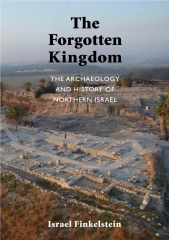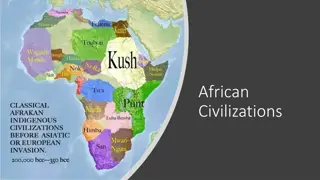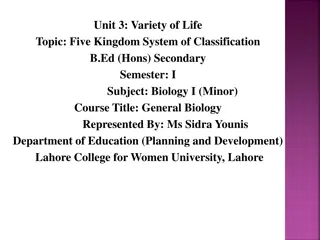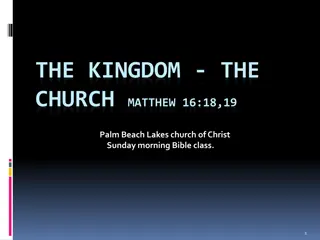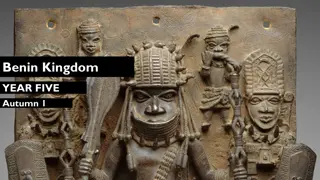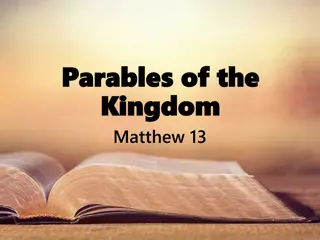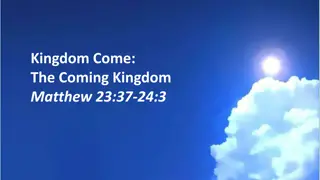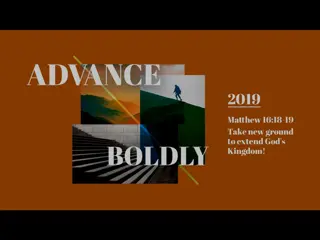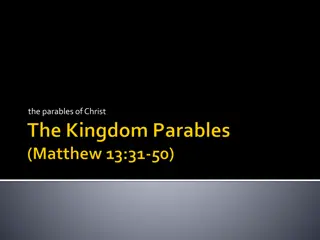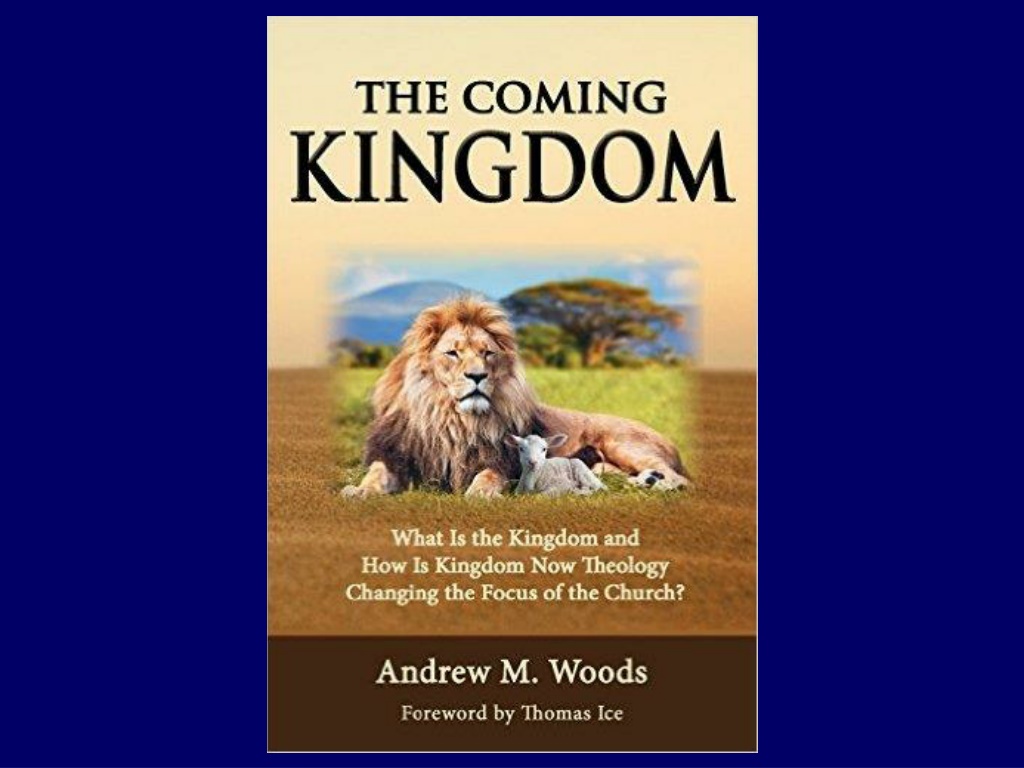
Insights on Kingdom Theology and Church Impact
Explore the Biblical perspective on the kingdom, understand the belief of the kingdom being present, and delve into the significance it holds. Discover how the Kingdom Now theology influences the church through various aspects like the loss of pilgrim status, Social Gospel, and more.
Download Presentation

Please find below an Image/Link to download the presentation.
The content on the website is provided AS IS for your information and personal use only. It may not be sold, licensed, or shared on other websites without obtaining consent from the author. If you encounter any issues during the download, it is possible that the publisher has removed the file from their server.
You are allowed to download the files provided on this website for personal or commercial use, subject to the condition that they are used lawfully. All files are the property of their respective owners.
The content on the website is provided AS IS for your information and personal use only. It may not be sold, licensed, or shared on other websites without obtaining consent from the author.
E N D
Presentation Transcript
Kingdom Study Outline 1. What does the Bible Says About the Kingdom? 2. Why do some believe that we are in the kingdom now? 3. Why does it matter?
9 Ways Kingdom Now Theology Impacts the Church 1. Loss of pilgrim status 2. Social Gospel 3. Ecumenical & interfaith alliances 4. Rejection or marginalization of Bible prophecy 5. Building the wrong kingdom 6. Charismatic theology 7. Prosperity Gospel 8. Anti-Israelism 9. Lordship Salvation
9 Ways Kingdom Now Theology Impacts the Church 1. Loss of pilgrim status 2. Social Gospel 3. Ecumenical & interfaith alliances 4. Rejection or marginalization of Bible prophecy 5. Building the wrong kingdom 6. Charismatic theology 7. Prosperity Gospel 8. Anti-Israelism 9. Lordship Salvation
Lewis Sperry Chafer vol. 5, Systematic Theology (Grand Rapids, MI: Kregel Publications, 1993), 350. So the church was fully warned from the beginning about the nature of this age, and taught concerning her pilgrim character while here and her holy calling and separateness from the evil age.
9 Ways Kingdom Now Theology Impacts the Church 1. Loss of pilgrim status 2. Social Gospel 3. Ecumenical & interfaith alliances 4. Rejection or marginalization of Bible prophecy 5. Building the wrong kingdom 6. Charismatic theology 7. Prosperity Gospel 8. Anti-Israelism 9. Lordship Salvation
9 Ways Kingdom Now Theology Impacts the Church 1. Loss of pilgrim status 2. Social Gospel 3. Ecumenical & interfaith alliances 4. Rejection or marginalization of Bible prophecy 5. Building the wrong kingdom 6. Charismatic theology 7. Prosperity Gospel 8. Anti-Israelism 9. Lordship Salvation
Clarence Larkin Rightly Dividing the Word, 48. The great mistake the Church has made is in appropriating to herself in this Dispensation the promises of earthly conquest and glory which belong exclusively to Israel in the Millennial Age. As soon as the Church enters into an Alliance with the World, and seeks the help of Parliaments, Congresses, Legislatures, Federations and Reform Societies, largely made up of ungodly men and women, she loses her spiritual power and becomes helpless as a redeeming force.
9 Ways Kingdom Now Theology Impacts the Church 1. Loss of pilgrim status 2. Social Gospel 3. Ecumenical & interfaith alliances 4. Rejection or marginalization of Bible prophecy 5. Building the wrong kingdom 6. Charismatic theology 7. Prosperity Gospel 8. Anti-Israelism 9. Lordship Salvation
Biblical Prophecy: Importance 27% of Scripture was prophetic at the time it was written 2 Pet 1:19
AUTHORITY OF SCRIPTURE V. 19
J. Dwight Pentecost Prophecy For Today, Page 20 A short time ago, I took occasion to go through the New Testament to mark each reference to the coming of the Lord Jesus Christ and to observe the use made of that teaching about His coming. I was struck a new with the fact that almost without exception, when the coming of Christ is mentioned in the New Testament, it is followed by an exhortation to godliness and holy living.
Justin Martyr Dialogue with Trypho, 80. But I and every other completely orthodox Christian feel certain that there will be a resurrection of the flesh, followed by a thousand years in the rebuilt, embellished, and enlarged city of Jerusalem as was announced by the prophets Ezekiel, Isaiah, and the others.
Clarence Larkin The Second Coming of Christ, 51. The KingdomIdea has robbed the Church of her UPWARDLOOK, and of the BLESSED HOPE. There cannot be any ImminentComing to those who are seeking to Set up the Kingdom.
Darrell Bock Darrell Bock, The Reign of the Lord Christ, in Dispensationalism, Israel and the Church, ed. Craig A. Blaising and Darrell L. Bock (Grand Rapids: Zondervan, 1992), 49 50. Being seated on David s throne is linked to being seated at God s right hand. In other words, Jesus resurrection-ascension to God s right hand is put forward by Peter as a fulfillment of the Davidic covenant, just as the allusion to Joel fulfills the new covenant. To say that Peter is only interested to argue that the Messiah must be raised misses the point of the connection in these verses and ignores entirely the allusion to Psalm 132 in the Davidic covenant. This passage and Luke 1:68 79 also counter the claim that no New Testament text asserts the present work of Jesus as a reigning Davidite sitting on David s Throne. The throne on which Jesus is said to sit is the one promised to David s descendent through the Davidic promise of 2 Samuel, which was initially passed on through Solomon. Jesus sits here as David s promised Son on David s promised Throne. This fits Old Testament imagery as well. The idea of sitting describes the idea of rule, as the parallelism of Jeremiah 22:30 shows. As the Davidic heir, Jesus sits in and rules from heaven.
Mark F. Rooker Mark F. Rooker, Evidences from Ezekiel, in A Case for Premillennialism, ed. Donald K. Campbell and Jeffrey L. Townsend (Chicago: Moody, 1992), 133. does not take the sacrifices in a literal sense but views Ezekiel writing in the 6th century B.C. describing worship from his unique perspective. . . . Ezekiel in referring to the literal worship of Yahweh in the millennium would be forced to use terms and concepts with which his audience was familiar. Because Ezekiel s audience would understand restoration in terms of the restoration of sacrifices, Ezekiel merely described restoration in these terms. Thus, Ezekiel s vision must not be understood as predicting the literal restoration of sacrifices in the millennium.
Robert Chisholm Handbook on the Prophets, 285-86. Ezekiel s vision of a Temple and a restored nation was not fulfilled in the postexilic period. How then should we expect the vision to be fulfilled? Scholars have answered this question in a variety of ways. On one end of the interpretive spectrum are those who see the vision as purely symbolic and as fulfilled in the New Testament church. On the opposite end are the hyper-literalists, who contend that the vision will be fulfilled exactly as described during the millennial age. In attempting to answer the question, one must first recognize that Ezekiel s vision is contextualized for his sixth-century B.C. audience. He describes the reconciliation of God and his people in terms that would be meaningful to his audience.
Robert Chisholm Handbook on the Prophets, 285-86. They would naturally conceive of such reconciliation as involving the rebuilding of the temple, the reinstitution of the sacrificial system, the renewal of the Davidic dynasty, and the return and reunification of the twelve exiled tribes. Since the fulfillment of the vision transcends these culturally conditioned boundaries, we should probably view it as idealized to some extent and look for an essential, rather than an exact fulfillment of many of its features. . . . The inclusion of so many minute details suggests that the temple described here will be a literal reality in the Jerusalem of the future. . . . However, the final sacrifice of Jesus Christ has made the Levitical system obsolete. . . . To return to this system, with its sin offerings and such, would be a serious retrogression.
Robert Chisholm Handbook on the Prophets, 285-86. Ezekiel s audience would have found it impossible to conceive of a restored covenant community apart from the sacrificial system. Now that the fulfillment of the vision transcends that cultural context, we can expect it to be essentially fulfilled when the Israel of the future celebrates the redemptive work of their savior in their new temple. . . . Ezekiel s audience would have found this portrayal quite natural. However, Jesus, the one who fulfills the vision, will have no need to offer such sacrifices, nor will he institute a dynasty.
John Calvin Commentary on Isaiah 35:1 Isaiah 35:1 The wilderness and the solitary place shall be glad. This passage is explained in various ways. I pass by the dreams of the Jews, who apply all passages of this kind to the temporal reign of the Messiah, which they have contrived by their own imagination.... I willingly view this passage as referring to Judea, and afterwards to other parts of the world.... Let us now see when this prophecy was fulfilled, or shall be fulfilled. The Lord began some kind of restoration when he brought his people out of Babylon: but that was only a foretaste, and, therefore, I have no hesitation in saying that this passage, as well as others of a similar kind, must refer to the kingdom of Christ; and in no other light could it be viewed, if we compare it with other prophecies.
John Calvin Commentary on Amos 9:13 Amos 9:13 Behold the days come, saith the LORD, that the plowman shall overtake the reaper, and the treader of grapes him that soweth seed: and the mountains shall drop sweet wine, and all the hills shall melt. Here the Prophet describes the felicity which shall be under the reign of Christ: and we know that whenever the Prophets set forth promises of a happy and prosperous state to God s people, they adopt metaphorical expressions, and say, that abundance of all good things shall flow, that there shall be the most fruitful produce, that provisions shall be bountifully supplied; for they accommodated their mode of speaking to the notions of that ancient people; it is therefore no wonder if they sometimes speak to them as to children. At the same time, the Spirit under these figurative expressions declares, that the kingdom of Christ shall in every way be happy and blessed, or that the Church of God, which means the same thing, shall be blessed, when Christ shall begin to reign.
John Calvin Commentary on Zechariah 14:4 Zechariah 14:4 And his feet shall stand in that day upon the mount of Olives and the mount of Olives shall cleave in the midst thereof toward the east and toward the west . For as we are dull and entangled in earthly thoughts, our minds can hardly rise up to heaven, though the Lord with a clear voice invites us to himself. The Prophet then, in order to aid our weakness, adds a vivid representation, as though God stood before their eyes. Stand, he says, shall his feet on the mount of Olives. He does not here promise a miracle, such as even the ignorant might conceive to be literal; nor does he do this in what follows, when he says, The mount shall be rent half to the east and half to the west. This has never happened, that mount has never been rent: but as the Prophet could not, under those grievous trials, which might have overwhelmed the minds of the godly a hundred times, have extolled the power of God without employing a highly figurative language, he therefore accommodates himself, as I have said, to the capacity of our flesh.
Isaiah 13-14 Day of the Lord (13:6-9) Cosmic disturbances (13:10-13) Global judgment (13:11-12) Sodom and Gomorrah (13:19) Complete and final desolation (13:20-22) Universal peace and rest (14:5-8) Israel s regeneration (14:1-4) Morris, Revelation Record, 348.
Jeremiah 50-51 Sudden destruction (51:8) Complete destruction (50:3, 13, 26, 39-40; 51:29, 43, 62) No reuse of building materials (51:26) Believers flee (50:8; 51:6, 45) Israel s regeneration (50:2, 4-5, 20; 51:50) Dyer, "The Identity of Babylon in Revelation 17 18 (Part 2)," 443-49.
Dr. John Walvoord The Nations in Prophecy, 63-64 As far as the historic fulfillment is concerned, it is obvious from both Scripture and history that these verses have not been literally fulfilled. The city of Babylon continued to flourish after the Medes conquered it, and though its glory dwindled, especially after the control of the Medes and the Persians ended in 323 B.C., the city continued in some form or substance until A.D. 1000 and did not experience a sudden termination such as anticipated in this prophecy.
Parallels Between Jeremiah 50-51 & Revelation 17-18 Jeremiah Revelation Associated with a Golden cup 51:7a 17:3-4; 18:6 Dwelling on many waters Intoxicating the nations 51:13 51:7b 17:1 17:2 Same name 50:1 17:5 Stone sinking into Euphrates 51:63-64 18:21 Sudden destruction 51:8 18:8 Destroyed by fire 51:30 17:16 Final, uninhabitable 50:39 18:21 Deserved God s people flee 50:29 51:6, 45 18:6 18:4 Heaven rejoices 51:48 18:20 Dyer, "The Identity of Babylon in Revelation 17 18 (Part 2)," 441-43.
Larkin, The Book of Revelation, 158. and this is in exact harmony with the words of Isa. 13:19. And Babylon, the glory of kingdoms, the beauty of the Chaldees excellency, shall be as when God overthrew Sodom and Gomorrah; and the Prophet Jeremiah makes the same statement. Jer. 50:40. The destruction of Sodom and Gomorrah was not protracted through many centuries, their glory disappeared in a few hours (Gen. 19:24 28), and as ancient Babylon was not thus destroyed, the prophecies of Isaiah and Jeremiah cannot be fulfilled unless there is to be a future Babylon that shall be thus destroyed. In Rev. 16:17 19, we are told that Babylon shall be destroyed by an Earthquake, attended with most vivid and incessant lightning and awful thunder.
Homer Heater "Do the Prophets Teach That Babylonia Will Rebuilt in the Eschaton?," Journal of the Evangelical Theological Society 41 (March 1998): 31-36; Robert B. Chisholm, Handbook on the Prophets (Grand Rapids: Baker, 2002), 53, 213 A similar approach is seen in Old Testament studies. Many view Isaiah 13-14 and Jeremiah 50-51 as describing Babylon's past fall in 539 B.C. rather than her future fall. The interpretation is held in spite of the fact that the details of these texts go far beyond the historic fall of Babylon. This interpretation is justified on the grounds that Ancient Near Eastern extra biblical writings often describe the destruction of foes in hyperbolic terms. Because Isaiah and Jeremiah incorporated a similar "destruction genre" in their description of Babylon's fall, the language of Babylon's destruction in Isaiah 13-14 and Jeremiah 50-51 can be applied to her historic fall rather than her future fall. Chisholm calls such language stylized and exaggerated and therefore argues that these texts were essentially fulfilled with the historic defeat of Babylon.
Reasons for Understanding 1000 Literally John s use of indefinite concepts elsewhere Revelation 20:8, 20:3 Exception to the # of years examples? Other numbers are taken literally Two witnesses (11:3), 7000 people (11:13), 4 Angels (7:1) 7 Angels (8:6),144,000 Jews (7:4), 42 months (11:2), 1260 days (11:3) Not always a symbolic interpretation (Rev. 17:18)
Robert Thomas Revelation 8 to 22: An Exegetical Commentary (Chicago: Moody Press, 1992), 408. RobertThomas observes that, "no number in Revelation is verifiably a symbolic number.
Darrell Bock Darrell Bock; quoted in Ken Sidey, For the Love of Zion, Christianity Today, 9 March 1992, 50. This minimization of the millennium is represented in the admission that Progressive Dispensationalism is less landcentered and less future centered than traditional Dispensationalism.
Kenneth L. Gentry He Shall Have Dominion: A Post Millennial Eschatology (Tyler, Texas: Institute for Christian economics, 1992), page 335. The proper understanding of the thousand-year time frame in Revelation 20 is that it is representative of a long and glorious era and is not limited to a literal 365,000 days. The figure represents a perfect cube of 10, which is the number of quantitative perfection.
John Calvin Institutes of the Christian Religion, III, xxv, 5. ButSatan has not only befuddled men s senses to make them bury with the corpses the memory of resurrection; he has also attempted to corrupt this part of the doctrine with various falsifications Now their fiction is too childish either to need or to be worth a refutation. And the Apocalypse, from which they undoubtedly drew a pretext for their error, does not support them. For the number onethousand [Rev. 20:4] does not apply to the eternal blessedness of the church but only to the various disturbances that awaited the church, while still toiling on earth Those who assign the children of God a thousand years in which to enjoy the inheritance of the life to come do not realize how much reproach they are casting upon Christ and his Kingdom.
Paul Lee Tan The Interpretation of Prophecy, 276-77 Evangelicals who spiritualize Bible prophecy cannot logically forbid liberals and modernists from spiritualizing selected areas of Christology and Soteriology. If evangelicals can spiritualize Christ's earthly kingdom, may not liberals spiritualize the earthly ministry of Christ, including His miracles and resurrection? The same hermeneutical principles used to spiritualize Bible prophecy can be used to spiritualize Christ's first advent. Christians who spiritualize parts of the Scriptures, such as it's prophetic portions, have forfeited a major element of their defense against liberalism.
9 Ways Kingdom Now Theology Impacts the Church 1. Loss of pilgrim status 2. Social Gospel 3. Ecumenical & interfaith alliances 4. Rejection or marginalization of Bible prophecy 5. Building the wrong kingdom 6. Charismatic theology 7. Prosperity Gospel 8. Anti-Israelism 9. Lordship Salvation

